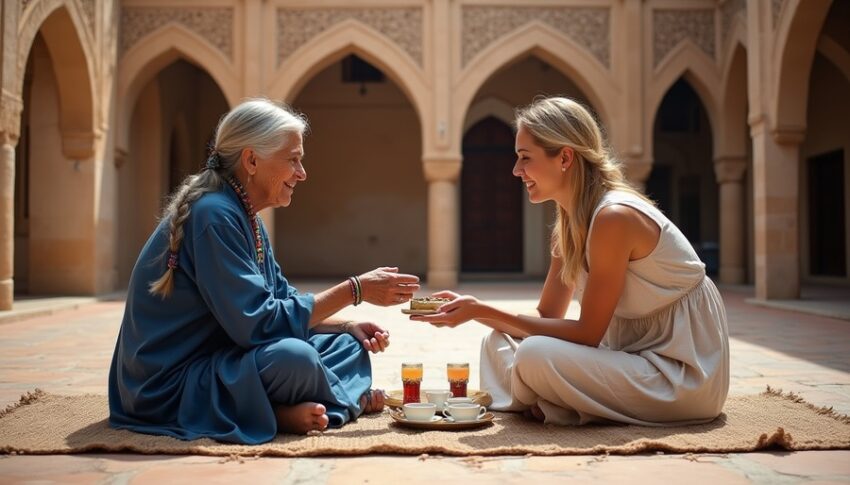
New Hidden Cost of the Spiritual Tourism Now in Morocco: Preserving its Heritage or Fueling Cultural Exploitation

Morocco is a renowned globally for its rich cultural heritage and spiritual depth, has experienced a surge in spiritual tourism, drawing countless international visitors seeking authentic and meaningful experiences. However, beneath the flourishing surface lies a growing debate about whether this influx represents the respectful preservation of Morocco’s heritage or risks commercial exploitation, endangering its cultural integrity.
Spiritual Tourism Boom: A Double-Edged Sword
Spiritual tourism in Morocco has rapidly gained popularity, with travelers attracted by the nation’s ancient traditions, mystical Sufi practices, vibrant festivals, and historically significant pilgrimage sites. Cities such as Fez, Marrakech, and Chefchaouen have become epicenters, showcasing spiritual festivals, music events, and immersive cultural experiences.
Yet, this tourism boom presents a double-edged sword, creating significant economic opportunities while simultaneously challenging local customs and community values.
Economic Benefits: Boosting Local Economies
Undeniably, spiritual tourism contributes substantially to Morocco’s economy, providing critical revenue streams and employment opportunities for local communities. Increased tourism stimulates growth in hospitality sectors, artisan trades, transport services, and small businesses, benefiting local economies.
However, the rapid commercialization of sacred spaces raises serious concerns about sustainability and long-term cultural preservation.
Cultural Integrity: Preservation Versus Commercialization
As spiritual sites experience increased visitation, concerns escalate regarding the commercialization of religious and cultural practices. Critics argue that certain traditions and sacred sites risk losing authenticity, with practices altered or diluted to cater to tourist expectations.
Balancing economic benefits with cultural preservation requires conscientious management and respect for community traditions, ensuring spiritual tourism enhances rather than exploits Morocco’s heritage.
Community Impacts: Respectful Engagement Needed
Local communities remain at the forefront of this debate. While spiritual tourism provides economic benefits, residents frequently express concerns about disrespectful visitor behaviors, disruption of sacred rituals, and increased commercialization pressures.
Ensuring community engagement and empowerment through tourism initiatives can help mitigate adverse impacts, allowing local voices to guide sustainable and respectful tourism development.
Ethical Tourism Practices: Promoting Responsible Travel
Adopting ethical tourism practices remains crucial to addressing exploitation concerns. Promoting respectful traveler behaviors, transparent tour operations, and fair economic distribution to local communities ensures tourism sustainability.
Encouraging responsible travel behaviors, such as appropriate attire, respectful participation in rituals, and supporting local artisans, enhances the overall tourism experience and fosters mutual respect.
Government and Industry Roles: Establishing Regulatory Frameworks
Effective government oversight and proactive industry involvement play essential roles in safeguarding Morocco’s spiritual heritage from commercial exploitation. Establishing clear regulatory frameworks and ethical guidelines ensures responsible tourism practices and protects cultural authenticity.
Collaborative efforts among governmental agencies, tourism operators, community leaders, and international organizations are crucial to creating sustainable tourism models that respect cultural integrity and community welfare.
Educational Initiatives: Informing and Empowering Travelers
Educating tourists about Morocco’s spiritual heritage and respectful travel practices significantly enhances the positive impacts of spiritual tourism. Comprehensive educational resources, awareness campaigns, and guided cultural experiences empower travelers to engage thoughtfully and respectfully.
Such educational initiatives help preserve cultural integrity, enhance visitor experiences, and foster deeper cross-cultural understanding.
Environmental Considerations: Sustainability in Tourism
The environmental impact of increased spiritual tourism also warrants careful consideration. The sustainability of sacred sites, natural environments, and local resources requires vigilant management, eco-friendly practices, and responsible visitor behaviors.
Incorporating sustainability principles into tourism operations helps protect Morocco’s environmental and cultural landscapes, ensuring long-term preservation and responsible use.
Challenges and Opportunities: Navigating Cultural Tourism Dynamics
While spiritual tourism presents considerable opportunities for Morocco, effectively managing cultural tourism dynamics remains challenging. Addressing issues of exploitation, cultural commodification, and community impact requires comprehensive planning, stakeholder collaboration, and adaptive management.
Proactive strategies, including cultural sensitivity training, community-based tourism initiatives, and continuous dialogue with local stakeholders, are essential for navigating these complexities successfully.
Long-Term Vision: Balancing Economic and Cultural Sustainability
Morocco’s long-term vision for spiritual tourism involves balancing economic benefits with cultural sustainability. Strategic planning emphasizes preserving heritage, fostering community participation, implementing responsible tourism practices, and protecting environmental resources.
This balanced approach ensures sustained economic contributions, cultural preservation, and enhanced community well-being.
Conclusion: Ensuring Ethical and Sustainable Spiritual Tourism
Rapid growth in spiritual tourism in Morocco highlights the paramount significance of responsible and sustainable tourism management. To overcome the implicit costs that cultural exploitation incurs through irresponsible management, empowerment of communities, and proper visitor interaction is essential.
By harmoniously weighing economic development with cultural heritage and the common good, Morocco can protect its diverse spiritual heritage and ensure that spiritual tourism continues to provide significant cultural enrichment as well as economic gain.
The post New Hidden Cost of the Spiritual Tourism Now in Morocco: Preserving its Heritage or Fueling Cultural Exploitation appeared first on Travel And Tour World.
New Hidden Cost of the Spiritual Tourism Now in Morocco: Preserving its Heritage or Fueling Cultural Exploitation
| Divisions of Shy Paris Entertainment | ||||
|---|---|---|---|---|
| Shyparis Entertainment | Shy Paris Bookings | Linkz Radio | Klublinks | Shy Paris |
Shy Paris Bookings is a Division of
❤Shy Paris Entertainment ||||| International Spectacular Events, Stellar Event Planning and Management, & Celebrity Booking Agency. Please contact us as we can provide you with both international and/or local renowned full service event planning and management, & celebrity bookings at shyparisentertainment@gmail.com or
CONTACT: Email: shyparisentertainment@gmail.com
Facebook: ShyParis Youtube: @Shyparis Twitter: @Shyparisent Instagram: shyparisentertainment Whatsapp: 1-437-259-3399
✶✶✶✶✶✶✶✶✶✶✶✶✶✶✶✶✶✶✶✶✶✶✶✶✶✶✶✶✶✶✶✶✶✶✶✶✶✶✶✶✶✶✶✶✶✶✶✶✶✶
SHY PARIS ENTERTAINMENT COMPANIES
✅ ShyParisentertainment.co – https://shyparisentertainment.co
✅ Shyparisbookings.com – https://shyparisbookings.com
✅ Linkzradio.com – https://linkzradio.com
✅ Klublinks.com – https://klublinks.com
✅ Shypariswebdesign.com – https://shypariswebdesign.com
✅ ❤️ Shyparis – htttps://shyparis.com❤️






